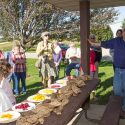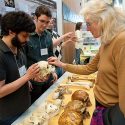‘Saturday Science at Discovery’ explores science at the South Pole
This month, “Saturday Science at Discovery” invites the public to “be cool and go polar” with a bilingual learning journey focused on the extreme science of the South Pole.
This free education outreach program will take place Saturday, Sept. 3, and is open to learners of all ages. Bilingual scientists will present sessions in English at 10 a.m. and Spanish at 11 a.m. in the Town Center at the Wisconsin Institutes for Discovery, 330 N. Orchard St. on the University of Wisconsin–Madison campus. No advance registration is required.
The guides for this program are scientists working for UW–Madison’s Project IceCube and Antarctic Meteorological Research Center, as well as science teacher Juan Botella from Monona Grove High School. Botella will share experiences he gained earlier this year when he worked for 60 days aboard a research vessel exploring the ocean waters surrounding Antarctica.
Among other topics, the scientists will reveal the frozen secrets of polar ice; why hundreds of scientists work in Antarctica; whether fur, feathers or fat provides the most warmth; why astronomers use a telescope buried deep underground; what people do for fun at the South Pole; and what it feels like to wear clothing designed for temperatures that reach minus 100 degrees Fahrenheit.
In addition, participants also can learn why astronomers and physicists are searching for neutrinos in Antarctica and how this research can help the search for dark matter. If weather permits, researchers stationed in Antarctica will meet with program participants using the institutes’ real-time TelePresence videoconference room, where life-sized images of attendees at remote locations create one virtual conference room.
The programs are held at the Town Center of the Wisconsin Institutes for Discover the first Saturday morning of every month with changing topics. Upcoming programs will explore the world of insects, geographic information systems (GIS), green energy and innovation. Public parking is available in lots 20 and 17.
For more information on the Wisconsin Institute for Discovery and the Morgridge Institute for Research, visit http://discovery.wisc.edu.



